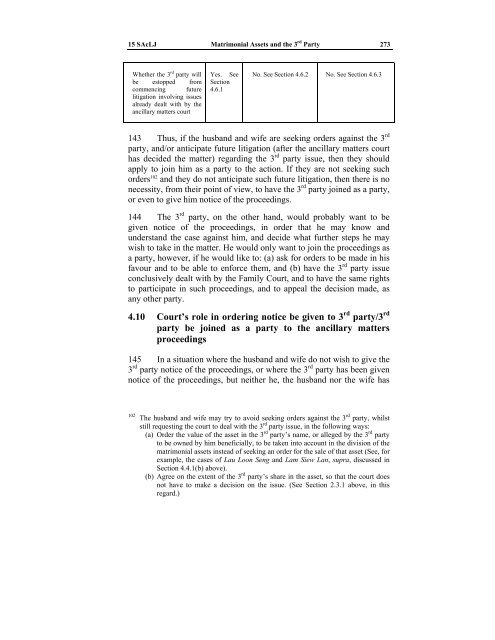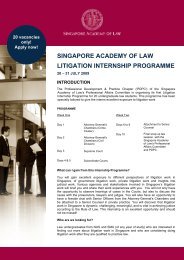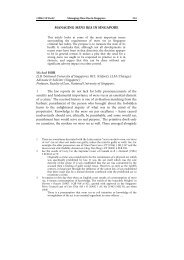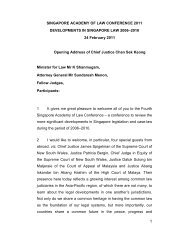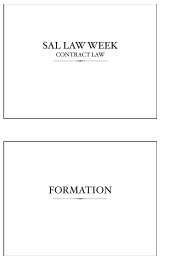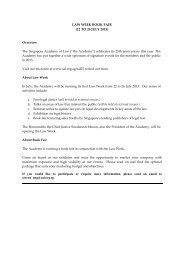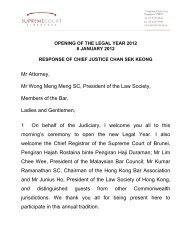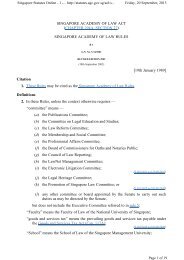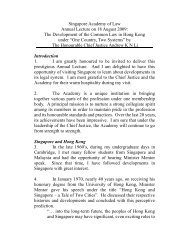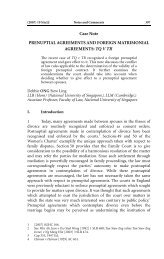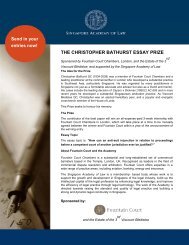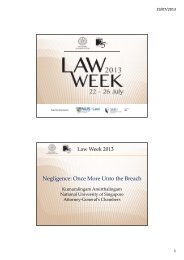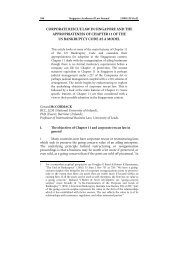View Article - Singapore Academy of Law
View Article - Singapore Academy of Law
View Article - Singapore Academy of Law
You also want an ePaper? Increase the reach of your titles
YUMPU automatically turns print PDFs into web optimized ePapers that Google loves.
15 SAcLJ Matrimonial Assets and the 3 rd Party 273<br />
Whether the 3 rd party will<br />
be estopped from<br />
commencing future<br />
litigation involving issues<br />
already dealt with by the<br />
ancillary matters court<br />
Yes. See<br />
Section<br />
4.6.1<br />
No. See Section 4.6.2 No. See Section 4.6.3<br />
143 Thus, if the husband and wife are seeking orders against the 3 rd<br />
party, and/or anticipate future litigation (after the ancillary matters court<br />
has decided the matter) regarding the 3 rd party issue, then they should<br />
apply to join him as a party to the action. If they are not seeking such<br />
orders 102 and they do not anticipate such future litigation, then there is no<br />
necessity, from their point <strong>of</strong> view, to have the 3 rd party joined as a party,<br />
or even to give him notice <strong>of</strong> the proceedings.<br />
144 The 3 rd party, on the other hand, would probably want to be<br />
given notice <strong>of</strong> the proceedings, in order that he may know and<br />
understand the case against him, and decide what further steps he may<br />
wish to take in the matter. He would only want to join the proceedings as<br />
a party, however, if he would like to: (a) ask for orders to be made in his<br />
favour and to be able to enforce them, and (b) have the 3 rd party issue<br />
conclusively dealt with by the Family Court, and to have the same rights<br />
to participate in such proceedings, and to appeal the decision made, as<br />
any other party.<br />
4.10 Court’s role in ordering notice be given to 3 rd party/3 rd<br />
party be joined as a party to the ancillary matters<br />
proceedings<br />
145 In a situation where the husband and wife do not wish to give the<br />
3 rd party notice <strong>of</strong> the proceedings, or where the 3 rd party has been given<br />
notice <strong>of</strong> the proceedings, but neither he, the husband nor the wife has<br />
102 The husband and wife may try to avoid seeking orders against the 3 rd party, whilst<br />
still requesting the court to deal with the 3 rd party issue, in the following ways:<br />
(a) Order the value <strong>of</strong> the asset in the 3 rd party’s name, or alleged by the 3 rd party<br />
to be owned by him beneficially, to be taken into account in the division <strong>of</strong> the<br />
matrimonial assets instead <strong>of</strong> seeking an order for the sale <strong>of</strong> that asset (See, for<br />
example, the cases <strong>of</strong> Lau Loon Seng and Lam Siew Lan, supra, discussed in<br />
Section 4.4.1(b) above).<br />
(b) Agree on the extent <strong>of</strong> the 3 rd party’s share in the asset, so that the court does<br />
not have to make a decision on the issue. (See Section 2.3.1 above, in this<br />
regard.)


